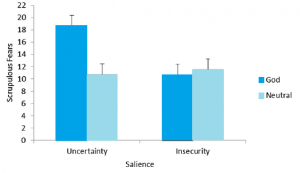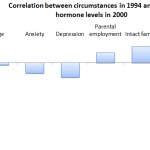There’s plenty of research about suggesting that feeling uncertain can increase the strength of belief in god in different ways. But what’s not clear is whether belief in god reduces the ill effects of uncertainty, or is a response to it. One theory is that a belief in God provides a kind of reassurance, which reduces anxiety.
The research is by no means clear-cut, however. Some research has found the opposite (see: God prompts can scare us into trying to do the impossible). That’s a sign that the situation is probably more complex than it looks at first sight.
Thomas Fergus and Wade Rowatt, of Baylor University, wondered whether the effects of reminding people about god varies with the situation. They recruited 120 religious people using Amazon’s Mechanical Turk and ran them through a battery of tests.
What they were trying to do was to see if priming people with ideas about uncertainty interacted with priming them with ideas about God. So, half the group had to briefly write about their experience of being uncertain, and the other half (the control group) had to write about their feelings of being insecure.
Then half the group had to unscramble sentences with religious words in, and the other unscrambled sentences without religious words. This is a standard way to subliminally heighten religious thoughts.
The result was four groups. only one of which had been primed both with uncertainty and with religion.
They then asked them about what’s called scrupulous fears, which includes fears of sin (e.g., I feel guilty about immoral thoughts I have had) and fears of God (e.g., I worry that God is upset with me).
The results were remarkable and not really what you might at first suspect.
 As the graphic shows, there was a big rise in scrupulous fears who were primed with both uncertainty and god, compared with all the other groups. The effect seemed to be strongest on fears of sin, rather than fears of God.
As the graphic shows, there was a big rise in scrupulous fears who were primed with both uncertainty and god, compared with all the other groups. The effect seemed to be strongest on fears of sin, rather than fears of God.
So priming with uncertainty alone or with God alone was not enough. It has to both at the same time.
The researchers reckon there could be two explanations for this.
The first might simply be that, when people fear uncertain, they become uncertain about their belief in god, which in turn raises their level of fear over god-related issues.
The second possibility is that priming people with ideas about god reminds them that god is watching over them (so they believe). The researchers suggest that, when made to feel uncertain, “the self-doubt that accompanies this state may lead individuals to become hypervigilant for signs that their demeanour could lead God to view them as immoral.”
All of which tends to suggest that belief in god can be a two-edged sword. If you are confident in your beliefs and that your god will excuse any lapses in your behaviour, then it may reduce fears and worry. if not, it may have the opposite effect!
![]()
Fergus, T., & Rowatt, W. (2015). Uncertainty, god, and scrupulosity: Uncertainty salience and priming god concepts interact to cause greater fears of sin Journal of Behavior Therapy and Experimental Psychiatry, 46, 93-98 DOI: 10.1016/j.jbtep.2014.09.003














